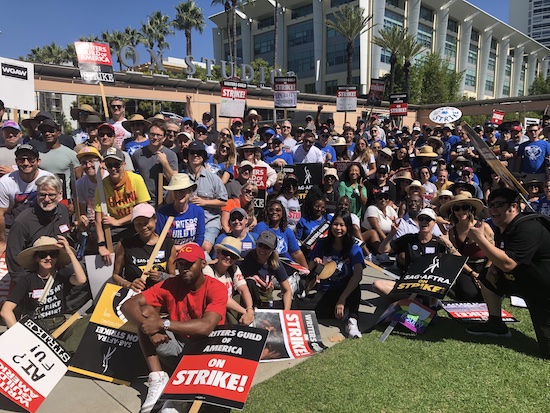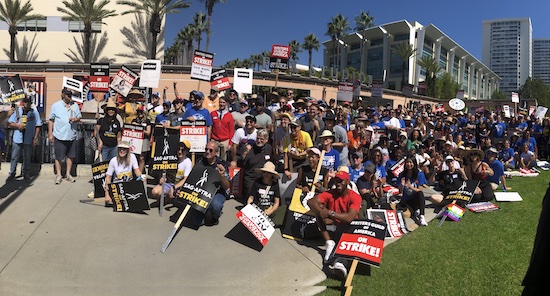Showrunners Express Solidarity Amidst the Ongoing WGA Strike: ‘We’re Sticking Together’
September 13, 2023 by Marisa Roffman

Credit: Marisa Roffman/Give Me My Remote
Hundreds of showrunners picketed the Fox lot on Tuesday, September 12 to show their ongoing solidarity amidst the WGA strike.
“There’s been some things in the press—very, very recently, perhaps—that might suggest there’s a dissident group, which is not the case,” Amy Berg (WARRIOR NUN, CAPER, EUREKA), who organized the picket, tells Give Me My Remote. “We have probably close to 300 showrunners here…If that’s not a big sign of solidarity, I don’t know what is.”
In fact, the turnout for the showrunner picket was so large the location ran out of parking spots and WGA signs…for the first time since the strike began on May 2.
“We’ve been on strike for a long time now, and I think it’s important for everyone on both sides to see that people are still committed,” Will Graham (A LEAGUE OF THEIR OWN, DAISY JONES & THE SIX) says. “We support the negotiating committee and support trying to create a structure for this industry that’s gonna bring us into a better future for everybody.”
Amongst the showrunners at the picket—and in general since they first started hitting the lines—a large concern going forward is about preserving writing as a career for the next generation. (To assist with that, the WGA is asking for a minimum writers’ room size, which will vary on a number of factors, including episode count.)
“I’m here as a ‘we,’ not as an ‘I,’” Kevin Williamson (TELL ME A STORY, THE VAMPIRE DIARIES, DAWSON’S CREEK) says. “I’m here for all of the writers of tomorrow, so that we can get a fair deal. We’re in a new universe with the streaming and the internet, and all these new avenues of distribution. I really do think that the contracts need to catch up with that. And they currently are not. It’s a very pivotal point and if we’re not here today, I’m not sure we’ll be here tomorrow. That’s why I’m striking—for the writers of tomorrow.”
“Obviously at the point where I am in my career, I’m gonna get minimal benefits from whatever improvement [this negotiation brings], but it’s all about paying it forward from the people who went out on strike that allowed me to have residuals, the pension plan, and health plan,” adds René Balcer (LAW & ORDER, LAW & ORDER: CRIMINAL INTENT, FBI: MOST WANTED). “Before the strike, I had kind of a vague idea of how tough it was for them, but the strike has really crystallized just how impossible it is for writers under the current MBA to have anything like the kind of career that I was very lucky to have.”
Previously, most showrunners started off as a lower level writer before rising up in the ranks—allowing them time to learn how to most efficiently write for television and run a show. Now, with the rise of streaming and shorter order shows, frequently a small group of writers get together and break the season-long arc; scripts are turned in prior to production starting, with only the showrunner (and perhaps an additional upper level writer) being kept on for the duration of the filming. Not only does that put more work on showrunners, but it means future showrunners won’t have the necessary hands-on experience to lead their own shows.
“I learned how to be a good showrunner by being able to learn from being an assistant,” Beth Schwartz (ARROW, SWEET TOOTH)—who began as a writers’ assistant on ARROW before rising up to showrunner at the end of the series— says. “I learned to be able to produce my own episodes being mentored by people like Greg Berlanti. And that really doesn’t exist that much anymore…I was able to see how people run the room, I was allowed to be on notes calls, in everything. And then even just becoming a staff writer and rising the ranks that way, as well, that’s how you learn how to produce as a writer.”
Now, as a showrunner, “I mentor all my assistants,” she continues. “I feel like I try to explain every single step of the process to them. And we always let our assistants be in the room, whether it’s script coordinator or the writers’ PA, just so you can experience how the room is run.”
Williamson—who calls a writers’ room “one of my greatest pleasures; it’s a community”—has also been frustrated by the opportunities for young writers. “I work with so many people that are trying to break in, they’re trying to get a job,” he says. “In the old days, you could maybe give them a script and then get them on staff. And now there’s no room for them; they’ve been completely expelled. And that’s not okay—that’s our future. Those writers, those voices, are what we need to carry on.”
Joe Henderson, who rose through the ranks on shows like WHITE COLLAR, GRACELAND, and ALMOST HUMAN before showrunning LUCIFER, acknowledges writers are “gonna fight for the future of our industry.”
“That is both for future writers, but also I firmly believe the industry itself, because this fight is about making sure that we have the sense of structure that allows people to grow and learn and become better showrunners,” he says. ”[Then writers can] make better shows and make them on a budget that will actually save the studios money. To me, this fight has always been about lowering the ladder back down and making sure that staff writers of then get to become the showrunners of now in the same way that when I was a staff writer, there was a ladder. And you can see it disappearing; every passing year, it got harder and harder to find. It’s important that we lower that ladder back down.”
“It’s important that we support the very health of our industry,” he continues. “And one of the things I’m very excited about is so many showrunners agree and believe in this. [During the] 07-08 [strike], I was support staff; I was pre-WGA. And I saw a lot of people ahead of me fight for me. Now it’s my turn.”

Photo credit: Marisa Roffman/Give Me My Remote
With negotiations also around the corner for IATSE crew members, multiple showrunners expressed hope their negotiations would lay the groundwork for a better contract for their crews.
“All of the showrunners are coming together [here] to say all of the things the Writers’ Guild is asking for, and SAG-AFTRA is asking for, are incredibly reasonable,” DJ Nash (A MILLION LITTLE THINGS, GROWING UP FISHER) says. “They will pave the way for the requests and fair demands that IATSE will have in the future. We are on the line today knowing the sacrifices that many people had to make in order for work to be a safe and fun place for writers and actors.”
“We’re at a crossroads right now, because of our other crew members who are going to be asking for things in the future,” he continues, noting that a showrunner’s job was to take care of their people. “That’s all the more reason why we need to get us here now. Because if we walk away, we’ll only weaken their chances.”
To that end, the showrunners brought more than just themselves to the picket. “We want to be able to show our thanks, our appreciation, our support, for our support staff and crew, who might be going through some s— right now; to say we got you and we appreciate you,” Berg says. “And so we’re collecting gift cards. Next Tuesday, the 19th, we’re doing an IATSE appreciation day [at Fox]. We’ll do gift cards, we’ll have raffles, food trucks, It’s gonna be a big day of just thank you, we love you guys, hang in there.”
Showrunners have also been donating food and food trucks to picket lines to feed writers, actors, and their supporters over the past 130-plus days. Balcer, who sent multiple trucks to every lot, jokes his motives were selfish: “I wanted to fatten up the guild membership, so I would look slim; it’s complete vanity.”
In all seriousness, “I’m on the road a lot anyways, and when I can’t be here to picket, this is another way of showing support,” Balcer says. ”[It’s] also to encourage people to feel that the picketers are being supported. And it’s a way of sticking a thumb into the AMPTP’s eye.”
Even outside of this special-themed day, many showrunners have made it a point to be on the line as frequently as possible. “Being out there on the picket lines multiple times a week is just showcasing the diversity in this guild,” Keto Shimizu (LEGENDS OF TOMORROW), who pickets two to three times a week, says. “There are people who are coming out that are just getting started in their careers; there are people who have been doing this for decades. There are people, like me, who are sort of in the middle of all of that. And then it’s been incredible seeing the support from people even outside of our guild. That’s been what’s been so bolstering—it’s understood, throughout our entire industry, how important this fight is.”
Multiple showrunners also express how vital being on the lines has been for their mental health as the strike continues on.
“Honestly, I come out to the line to lift my spirits,” Henderson says. “This is where I get my fix. This is where I renew my faith. This is where everyone gets to compare notes and understand the solidarity that we have. I sit at home, and there are times when I spiral. There are times where I’m like, ‘I’m not sure what’s happening in this fight.’ I come to the line and I am reminded by pre-WGA, staff writers, co-producers, showrunners, how everyone knows how important this fight is. But it’s the line that reminds me of that, it’s the line that keeps me going, and reinvigorates me.”
“For me, it’s become very therapeutic to talk to my fellow writers,” Mike Royce (ONE DAY AT A TIME, ENLISTED, MEN OF A CERTAIN AGE) says. “I have two guys who I met on the strike line in 2007, the first day, and we still picket together two to three times a week. In a terrible time, you have to make good things happen wherever you can. So we have a friendship; I like talking with them and [it] keeps our spirits high.”
Being together on the line—and having a social media platform like Twitter—has made it “pretty obvious that rumors get squashed very quickly,” Balcer says. “It’s very easy as writers to feel isolated, to feel like you’re the only one who’s suffering in the strike. And misery loves company…I’ve been through five strikes. This strike is completely different from all the other ones, not only because of the issues, but just how the guild is organized and how people are supporting each other. And the level of enthusiasm, that’s amazing. And that’s what’s driving the AMPTP crazy.”
”[Being on the line] helps to dispel the crazy sort of disinformation that’s coming now over the last couple of weeks,” Royce adds. “It seems to be a little more aggressive coming from the new crisis PR firm. When you hire a crisis PR firm, that’s not because someone else is in crisis—you’re in crisis. So they’re trying to shift the crisis onto us and it’s not going to work.”
With the WGA awaiting the AMPTP’s response to their counterproposal—which the WGA delivered in August—the showrunners remain clear: They are united.
“Every showrunner has different opinions,” Royce says. “But the one thing we’re all united behind is to get a fair deal, behind our negotiating committee. We know that that’s how the system works. I don’t know how many showrunners there are—let’s say there’s a thousand. That means there’s a thousand different people, with a thousand different ways that this should go, because they’re showrunners and they’re used to being listened to. But the one thing that unites us all is this cause. We know we have to keep going until it’s over. We wish it weren’t taking this long, and that causes frustration, but it’s not over yet. So we’re sticking together.”
“If anyone in this town thinks the vast majority of this guild is divided, they are soundly mistaken,” Shawn Ryan (SWAT, THE NIGHT AGENT, THE SHIELD) adds. “And the sooner we can dispense with some of these union-busting tactics and just get into the room and negotiate and figure out what’s fair for us, what’s fair for them, and what’s good for the business long-term, we all can come out [ahead]…but the longer this goes on, the more people get hurt. So I would say forget the little games, let’s just get into a room, and figure this out.”
RELATED:
- Alexi Hawley on the Importance of the Highlighting the Solidarity Amongst WGA and SAG-AFTRA: ‘Nobody’s Breaking This Union’
- THE OC Team Reunites to Support the Ongoing WGA and SAG-AFTRA Strikes
- The SUPERNATURAL Team Reunites for ‘the Most Epic’ Reunion Supporting the WGA and SAG-AFTRA Strikes
- Tracy Spiridakos and Jesse Lee Soffer Explain the Importance of Striking: ‘It’s a Watershed Moment’
- WGA, SAG-AFTRA, and More Picket on Behalf of Support Staff: ‘They Really Are the Heart and Soul of a Writing Staff’
- Danny Pino Explains the Importance of Residuals for the Striking Actors and Writers
- The GLEE Cast and Creative Team Reunite to Support the WGA and SAG-AFTRA Strikes: ‘We’re At a Turning Point in Our Industry’
- WGAW Latinx Writers and SAG-AFTRA National Latino Committee Unite for an Inspiring Picket: ‘Latinos Know How to Fight a Labor Fight’
- Sera Gamble Highlights the Importance of Writers’ Rooms
- Team SWAT Shows Their Support for the Ongoing WGA and SAG-AFTRA Strikes: ‘We’re Asking for Dignity and Respect’
- The ARROW Writers and Cast Reunite to Picket—and Raise Money for Charity—in Support of WGA and SAG-AFTRA
- SUPERNATURAL Vets Sebastian Roché, Ruth Connell, and Rob Benedict on the Ongoing Strikes: ‘It’s a Fight That We Are Going to Win’
- Day 100 of the WGA Strike: Rob Forman Explains the Stakes for Everyone
- The FAMILY GUY Team on the WGA and SAG-AFTRA Strikes: Sometimes It’s ‘the Only Way to Get Something Done’
- TTIE Leaders Explain the WGA Strike Stakes for Historically Excluded Writers
- The Teams Behind LAW & ORDER: ORGANIZED CRIME and FBI: MOST WANTED Explain Why They’re Supporting the WGA and SAG-AFTRA Strikes: ‘It Is a Fight For Our Lives’
- THE X-FILES: David Duchovny and Rob Bowman on the Importance of the WGA and SAG-AFTRA Strikes
- The BONES Team Reunites to Support the Ongoing WGA Strike
Follow @GiveMeMyRemote and @marisaroffman on Twitter for the latest TV news. Connect with other TV fans on GIVE ME MY REMOTE’s official Facebook page or our Instagram.
And be the first to see our exclusive videos by subscribing to our YouTube channel.
As an Amazon Associate we earn from qualifying purchases made through links/ads placed on the site.
Related Posts
Filed under Strike
Comments Off on Showrunners Express Solidarity Amidst the Ongoing WGA Strike: ‘We’re Sticking Together’



Comments